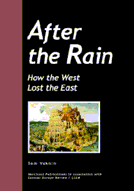Political history is largely an account of mass violence and of the expenditure of vast resources to cope with mythical fears and hopes. —Murray Edelman
In the interregnum that Koštunica's regime most likely is, ideas proliferate with febrile urgency. EU officials talk of a "Southeast European Association" (substantially economic). Koštunica—perhaps about to be replaced by his puppet-masters, Đinđic and maybe Drašković— contemplates the substitution of a "Republic of the Serbs, Croats and Slovenes" for "Yugoslavia." It is all a chilling deja-vu. Balkan history books rarely require a second edition.
The Fragmentation of Yugoslavia: Nationalism and War in the Balkans is the second edition of a tract in political science. It is interesting to compare the tables of contents of both editions: "Slovenia and Croatia at War" becomes "Wars for Independence: Slovenia and Croatia"; "War in Bosnia Hercegovina" mutates to "An Unfinished National Liberation"; the chapter "A War against the Serbs or a US-brokered peace" vanishes altogether and another enters—"Kosovo: National Liberation through Foreign Interventions."
Is there no end?
Pavković identifies four cycles of grievance-fuelled and paroxysmal national liberation wars. We are amidst the fourth, he says and offers a naive and impractical solution: plebiscites in the contested areas (Western Macedonia, Kosovo, Krajina, etc). Exasperatingly, the author asks in an epilogue: "National Liberations: Is there an end to them?".
With the stirrings in Montenegro and the forthcoming civil war in Kosovo, it doesn't seem so. But the author does a superb job of charting the territory with only the slightest and almost imperceptible (and inevitable) bias. He cleverly heaps disclaimer upon disclaimer
|
Yet, the result is much more than this. It is the history of the cold-blooded and murderous manipulation of the unsuspecting peoples of the region by their rapacious and inane elites. It is the melancholy and recurrent tale of how "national ideologies," "national liberation movements," "national myths" and history itself, molested and mutilated, were all used to corrupt the people, intimidate them to submission, hurl them at each other and transform them, time and again, into bloodthirsty mobs. No one is exempt, none exonerated.
Tenuously conjured, precariously maintained, autocratically or centrally administered, thuggishly missionary and assimilative and always xenophobically mutually exclusive, these forged national "identities" (replete with desultory history, folk customs and lore) were weapons of mass destruction, fatuously and short-sightedly and suicidally employed time and again.
Recipe for disaster
Yugoslavia was the result of conflicting political models imposed in rapid succession on rival (or indifferent), heavily mixed populations by venal politicians. The first model was incorporation (or merger) of all the nationalities into a meta-state. Its alternative was exclusionary: ethnic cleansing achieved by population transfers or harsher measures.
Federalism versus unitarianism, equality of nations versus the dominant nation paradigm. This was a choice faced by virtually all the denizens of Europe in the nineteenth century. Some, such as the Italians and the Germans, succeeded in creating and sustaining their own "Yugoslavia." Others, such as the Slavs of the South—failed dismally. They failed because they were not as homogenous as they—and others—thought they were. The label "Yugo-Slavs" misled many into thinking of Macedonians, Serbs, Croats and Slovenes as "tribes" or
| These federal borders... should be something similar to those white lines on a marble column... What is the meaning of federal units in
today's Yugoslavia? We don't consider them a group of small nations; rather, they have a more administrative character, the freedom to
govern oneself. That is the character of independence of each federal unit, full independence in the sense of free cultural and economic
development.
Tito (quoted, p 48) |
Moreover, the national ethoses of the Yugo-Slavs were concerned more with the identification and extirpation of the "enemy" than with the running of an economically underdeveloped state. The national myths were used to mobilize the nation to resist foreign occupiers or ethnic fifth columns and fight them, not to cope with an emergent modern polity. They were characterized by whining and complaining (against iniquities, inequalities and injustice), not by planning and production. These were negative and adversarial narratives, rather than positive platforms. They were incompatible with Yugoslavia and rendered it redundant.
The author records drily and meticulously the paradox that Yugoslavia was. The cadres of Communism, the supranational ideology, formed the kernels of the nationalist-bourgeois elites of the future republics. Self-management, that uniquely Titoist hybrid of grassroots democracy and stifling bureaucracy, paved the way to both participatory

|
Communist leaders usurped the nationalists' agenda and co-opted its leaders, transforming marginal and virulent ideologies into mainstream politics. The Serbs proudly ignored the Western media—to their detriment. Yugoslavia disintegrated on television, in bloodied frames and to vehement narration.
The Fragmentation of Yugoslavia is a sad tale of good intentions and the road to hell, aptly told. It is a recommended and thrilling introductory text and a thorough documentation of the human folly and malice that put the noble idea of "Brotherhood and Unity" to such a butchered end.
Sam Vaknin, 6 November 2000
 The author:
The author:
The author is General Manager of Capital Markets Institute Ltd, a consultancy firm with operations in Macedonia and Russia. He is an Economic Advisor to the Government of Macedonia.
DISCLAIMER: The views presented in this article represent only the personal opinions and judgements of the author.
Moving on:

Sam Vaknin's book on sale from CER as a print book and as an ebook Read an external review
|
- Archive of Sam Vaknin's articles in CER
- Browse through the CER eBookstore for electronic books
- Buy English-language books on Central Europe through CER
- Sam Vaknin's Website
- Return to CER front page




